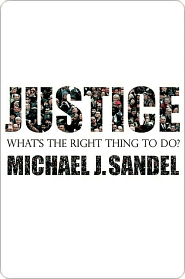Harvard professor Michael J. Sandel teaches one of the most popular courses on campus. Entitled “Justice,” it asks students to engage questions about the society in which they live in a way that challenges preconceptions. Sandel’s course is now the basis of a series for PBS, and it provides the material for his new book, Justice: What’s the Right Thing to Do? I put six questions to Sandel about his book.
1. You call your book Justice: What’s the Right Thing to Do? Is the subtitle meant to suggest that when you use the word “justice” you mean moral philosophy, not justice as a political process?

The book deals with both. It tries to show that questions of justice arise in politics and also in our everyday lives. Consider the arguments we have these days about Wall Street bailouts and bonuses, health care, the gap between rich and poor, abortion, same-sex marriage. Are these questions of justice or of morality? Well, both. We can’t resolve these issues without thinking through some large moral questions.
Some people draw a sharp distinction between the moral issues we confront in our personal lives and the questions of justice that arise in politics. I don’t. It’s true that deciding questions of justice involves a political process. In a democracy, this usually means deliberating and then voting. But deliberation (at its best) requires reasoned moral argument. Otherwise, political argument descends into the shouting matches that abound these days on talk radio and cable television. To be a citizen is to be something of a philosopher.
2. You describe a situation in which the members of a combat mission composed of Navy SEALs wrestle with what to do with some Afghan goatherds who spot them—should they kill them out of concern that they will betray the SEALs’ position to the Taliban, or let them go? They choose the latter course with dire circumstances, when nineteen Americans in uniform are killed. Does your case get all the variables right? First, you have restricted the options to two, but you leave more sensible options undiscussed. The goatherds could, for instance, have been captured, or tied up with flexcuffs so they couldn’t get back to their village for many hours. Second, from a military justice perspective, the question would have been quite different, namely, did the SEALs act within the rules of engagement they were given for the mission? Why did you exclude these considerations from your case presentation?
A more robust public engagement with our moral disagreements could provide a stronger, not a weaker, basis for mutual respect. Rather than avoid the moral and religious convictions that our fellow citizens bring to public life, we should attend to them more directly—sometimes by challenging and contesting them, sometimes by listening to and learning from them. There is no guarantee that public deliberation about hard moral questions will lead in any given situation to agreement—or even to aoorecition for the moral and religious views of others. It’s always possible that learning more about a moral or religious doctrine will lead us to like it less. But we cannot know until we try.
A politics of moral engagement is not only a more inspiring ideal than a politics of avoidance. It is also a more promising basis for a just society.
—From Justice: What’s the Right Thing to Do?
Reprinted by permission of the publisher, Farrar, Straus and Giroux. Copyright © 2009 Michael J. Sandel
The Navy SEALs considered tying up the Afghan goatherds who had happened upon them, but, believe it or not, they didn’t have any rope or handcuffs. They did consider military rules of engagement, but they still had to make a judgment about whether to kill the goatherds, who were unarmed but might nonetheless pose a risk to their mission and lives. So a moral judgment of some kind was unavoidable. The SEALs team wrestled with the question as a moral question, which is what makes this such a powerful story.
But the broader point is this: It can often be clarifying to think about real-life dilemmas that lack obvious practical solutions, in order to examine the moral principles at stake. Think of the debates we have about the ethics of torture. Former Vice President Cheney argues that torturing terrorist suspects is justified because it saves innocent lives. Some opponents of torture reply that torture never produces reliable information. But to reach the issue of principle (is torture morally impermissible?), we need to set aside this empirical claim and ask whether torture would be justified even if it did sometimes yield valuable information.
3. You present the question of the draft as a moral issue for society, and you trace it from the draft riots of the Civil War to the present day. Politicians today appear broadly to support a professional army as a way of avoiding the public controversy presented by the draft. It also means that when the nation goes to war, there’s less of a public storm over the decision. Do you think they’re unfairly ducking an important moral issue?
Yes. There are two reasons to consider either conscription or some form of universal national service that would include military service as an option. One is the reason you suggest: if the decision to go to war does not involve any risk or sacrifice on the part of those making the decision, wars will be undertaken too lightly. The Iraq war is an example. Few members of Congress or the administration had family members who served in the war.
A second reason is one of fairness: The volunteer army draws disproportionately from the lower middle class. The sons and daughters of the affluent are largely exempt. But if the nation decides to go to war, there is something to be said for sharing the sacrifice, rather than hiring those who cannot otherwise afford college to fight and die on our behalf.
4. You criticize political liberals in America for a cop-out in avoiding religion in public discourse, which you see as a proper part of moral debate. The countervailing argument would be that religion has been used to mobilize voters when the politicians on the right who use it are actually indifferent to the underlying issues. Are liberals right to worry that bringing morals and religion into politics leads to intolerance?
Yes, to this extent: in a pluralist society such as ours, bringing morality and religion into politics does carry certain risks. But these risks are unavoidable in democratic politics. Liberals in recent decades have made the mistake of ceding to religious conservatives a monopoly on some of the most potent sources of political argument. It hasn’t always been this way. Think back to the abolitionists, some of whom were evangelical Christians, who argued that slavery is a sin; or to Martin Luther King, who drew on religious arguments against segregation.
While it’s true that some people use religion cynically, it’s also the case that, on many political issues, it’s not possible to be neutral on the underlying moral question. I think liberals should engage rather than avoid the moral and religious convictions that citizens bring to public life—whether the issue is abortion, same-sex marriage, poverty, health care, or the environment.
5. You point out that the average school teacher makes $43,000 a year, while David Letterman makes $31 million. And that CEOs of major companies make 344 times the pay of the average worker. Are these big pay differentials fair? Is there any standard of fairness other than supply and demand?
Libertarians argue that any distribution of income that results from a free market is fair. But market outcomes reflect morally arbitrary contingencies, of two kinds. First, some people start out with opportunities and skills that others lack—a supportive family, a good education, certain natural gifts. This lucky starting point is not their own doing.
Second, markets reflect supply and demand. It’s David Letterman’s good fortune that he lives in a society that happens to value the ability to tell jokes on late-night television. It’s not his doing that there is an extravagant market for his talent. So it can’t really be said that we deserve the bounty that the market bestows on our talents. This suggests that at least some of the outsized earnings of the successful should be taxed to serve the common good and to help the disadvantaged.
6. “The Gross National Product does not allow for the health of our children, the quality of their education or the joy of their play. It measures neither our compassion nor our devotion to our country. It measures everything, in short, except that which makes life worthwhile. And it can tell us everything about America except why we are proud to be Americans.” You quote a speech Robert F. Kennedy gave in Kansas in 1968 just before his death. What’s Kennedy’s point here, and why do you think his speech is so important for public discourse in America today?

Justice is inescapably judgmental. Whether we’re arguing about financial bailouts or Purple Hearts, surrogate motherhood or same-sex marriage, affirmative action or military service CEO pay or the right to use a gold card, questions of justice are bound up with competing notions of honor and virtue, pride and recognition. Justice is not only about the right way to distribute things. It is also about the right way to value things.
—From Justice: What’s the Right Thing to Do?
Reprinted by permission of the publisher, Farrar, Straus and Giroux. Copyright © 2009 Michael J. Sandel
It was a remarkable speech. Kennedy’s point was that affluence and economic growth were not enough to make for a just society, or a good society. In the midst of the Vietnam war and domestic turmoil, he tried to summon Americans to a more strenuous moral and civic idealism. He spoke movingly of the injustices of the war in Vietnam, poverty, and racial discrimination. But he thought we would never surmount these injustices unless we challenged the complacencies and self-satisfactions of the consumer society.
What I greatly admire about this speech, and about RFK, is that he saw a connection between a just society—one in which all citizens are treated fairly—and a good society—one in which we take civic obligation seriously and don’t allow ourselves to be distracted by material preoccupations.
In recent decades, liberals have tried to separate questions of justice from questions about the best way to live. This impulse reflects the fear that bringing morality into politics is a recipe for disagreement and intolerance. As I’ve suggested, I think this impulse is a mistake for which liberals have paid a heavy political price. To his credit, Barack Obama, during the 2008 campaign, reversed this tendency and inspired the electorate with a morally robust, faith-friendly civic vision.
One of the great costs of setting aside RFK’s moral and civic critique of consumerism is that it made progressives more accepting than they should have been of the market mania of recent decades. After Ronald Reagan and Margaret Thatcher, liberals and progressives moderated but consolidated the faith that markets are the primary instrument for achieving the public good. The financial crisis may have called that faith into question. But we haven’t yet found our way to a new politics of the common good.


